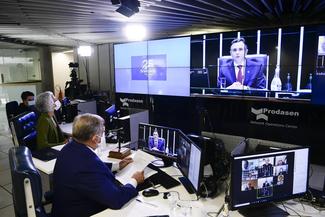- ImpactWe help parliaments to become greener and to implement the Paris agreement.We support democracy by strengthening parliamentsWe work to increase women’s representation in parliament and empower women MPs.We defend the human rights of parliamentarians and help them uphold the rights of all.We help parliaments fight terrorism, cyber warfare and the proliferation of weapons of mass destruction.We encourage youth participation in parliaments and empower young MPs.We support parliaments in implementing the SDGs with a particular focus on health and climate change.
- ParliamentsNearly every country in the world has some form of parliament. Parliamentary systems fall into two categories: bicameral and unicameral. Out of 190 national parliaments in the world, 78 are bicameral (156 chambers) and 112 are unicameral, making a total of 268 chambers of parliament with some 44,000 members of parliament. IPU membership is made up of 180 national parliaments
Find a national parliament
We help strengthen parliaments to make them more representative and effective.. - EventsVirtual eventThe International Court of Justice (ICJ) was constituted under the United Nations Charter to help nations settle disputes peacefully in accordance with international law.
- Knowledge
Discover the IPU's resources
Our library of essential resources for parliamentsGlobal data for and about national parliamentsLatest data and reports about women in parliamentResolutions, declarations and outcomes adopted by IPU MembersRecent innovations in the way parliaments workThe latest climate change legislation from the London School of Economics' database
CIP organizes first peer-assist event on digital broadcasting and ICT

Digital broadcasting of a hybrid sitting (©Senate of Brazil)
What is the relationship between ICT and digital broadcasting? Who is responsible for production and delivery of content? Who owns the rights?
On 31 August 2021, the IPU’s Centre for Innovation in Parliament (CIP) held its first ever peer-assist event, a new concept that brings together a small number of parliaments to discuss a specific question. This first event discussed the evolving relationship between ICT and broadcasting, a relationship that accelerated during the pandemic. Participants included senior IT and digital broadcasting staff from Canada’s House of Commons, and from the Parliaments of Finland, Ireland and South Africa.
PARLIAMENTARY EXPERIENCES
Digital broadcasting has become key to parliamentary openness and transparency. All participating parliaments at the event demonstrated a similarly high level of broadcasting capability.
However, they use different operational models, in which a key variant is the relationship between ICT and digital broadcasting. In some parliaments, ICT departments are responsible for infrastructure, bringing cost efficiency and management benefits, as well as better security, compatibility and integration. Communication teams held control of digital content production and delivery.
Other factors, which drive parliaments towards different operational models for digital broadcasting, include the constant evolution of digital broadcast technology, the growing need for tighter cybersecurity requirements, and the relatively scarcity of digital broadcast skills.
These operational models sit along a spectrum. At one end, digital broadcasting is managed entirely in house. At the other end, technology, including digital production and content delivery, is outsourced to external providers.
Initial suggestions on operational structure, included the following.
To be kept in house:
- Overall broadcasting strategy and planning.
- Control of broadcasting rules and use of material.
- Content programming and editorial control.
- Procurement and management of contractors and subcontractors.
To be outsourced:
- High-intensity work on technology solutions, systems and networks, which must however be well integrated with in-house ICT. Security is a primary consideration.
- Specialist technical services that would be uneconomical or difficult to keep in-house.
Is your parliament studying a particular innovation area and interested to take part in or benefit from a Peer-Assist, please tell us more by contacting the CIP team at [email protected]




